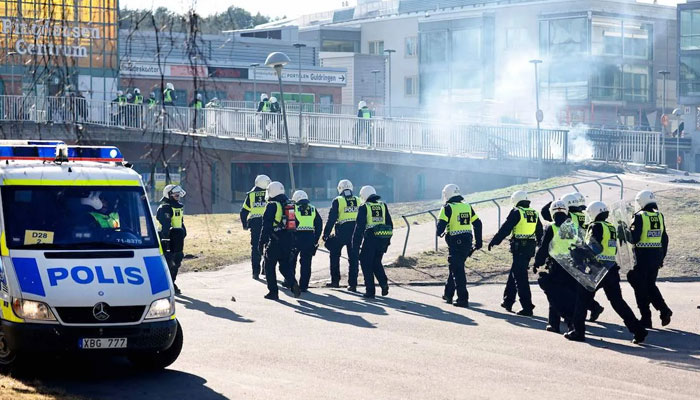Protesters in Sweden again desecrate Holy Quran under police protection
Desecration of holy books is legally permitted under Sweden's freedom of speech laws
Another shameful incident of desecration of the Holy Quran took place in Sweden's capital Stockholm amidst a heavy police presence outside Sweden's Royal Palace.
Two protestors desecrated the Holy Quran deeply wounding the religious sentiments of Muslims worldwide. The incident involved the burning of a copy of the Holy Quran, a display that has ignited a firestorm of emotions on the global stage.
This incident took place on Monday, marking the second instance within weeks wherein individuals chose to desecrate the Holy Quran.
Surprisingly, such actions are permissible under Sweden's freedom of speech laws.
The incident occurred at Mynttorget, a central square embraced by government edifices and the regal palace.
Throwing insult to injury, a megaphone was employed by the instigators, aimed at provoking counter-protesters.
However, a powerful show of unity emerged, as a multitude of individuals armed with their own megaphones came forward, silencing the provocative act and upholding the values of respect and tolerance.
The repercussions of such actions extend beyond national borders, generating ripples in the geopolitical realm.
This year, a series of Quran burnings have unfolded in both Sweden and Denmark, gathering intense reactions from Muslim nations.
These nations have appealed to the Swedish and Danish governments to address these incidents.
Condemning the repeated incidents, former Prime Minister Shehbaz Sharif said: Yet another incident of the desecration of the Holy Quran, this time in front of the royal palace in Sweden is highly disturbing.
The recurring nature of such reprehensible incidents establishes that there is a vile, sinister and evil intention behind them that aims at hurting the emotions of Muslims around the world.
Equally disturbing is the lack of action on the part of the Swedish government to check such incidents through strict enforcement of the law."
He added that a mere expression of regret and condemnation is not enough. "Let this be understood that the desecration of religious symbols, holy personages and Books damages the interfaith harmony that the world so desperately needs," said the former PM.
Furthermore, the series of Quran desecrations has given rise to security apprehensions concerning Swedish citizens abroad.
Notably, the Swedish embassy in Iraq bore witness to an unsettling act of protest as it was stormed and set ablaze last month by demonstrators.
Additionally, the United Kingdom's Foreign, Commonwealth, and Development Office have issued a travel advisory, cautioning against trips to Sweden due to potential terrorist threats stemming from these distressing occurrences.
Amidst the storm of controversies, the Swedish government has chosen not to undertake sweeping changes to its freedom of speech laws.
Yet, there exists a willingness among authorities to explore potential measures enabling police intervention, particularly if the public burning of sacred texts poses a genuine threat to national security.
As the world grapples with the intricacies of freedom of expression versus the sanctity of religious beliefs, Sweden's response serves as a crucial point of reference in navigating this complex discourse.
-
Alan Cumming shares plans with 2026 Bafta Film Awards
-
OpenClaw founder Peter Steinberger hired by OpenAI as AI agent race heats up
-
Chinese New Year explained: All you need to know about the Year of the Horse
-
Canadian passport holders can now travel to China visa-free: Here's how
-
Edmonton weather warning: Up to 30 cm of snow possible in parts of Alberta
-
ICE agents 'fake car trouble' to arrest Minnesota man, family says
-
China confirms visa-free travel for UK, Canada nationals
-
Bad Bunny's star power explodes tourism searches for his hometown












